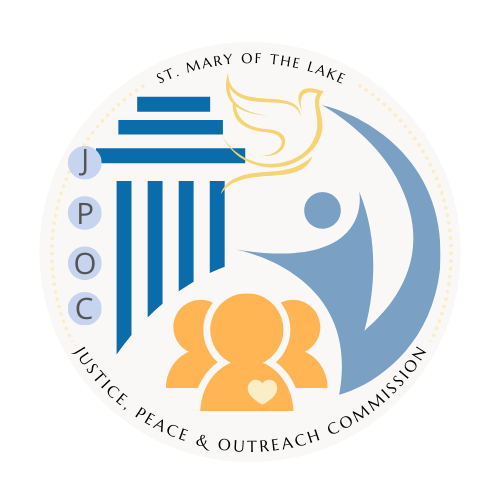Justice, Peace & Outreach Commission (JPOC)
The members of JPOC, rooted in Catholic Social Teaching, have committed themselves to the ministry of encounter – disciples “who know, follow, and go forth to share Jesus Christ”. We invite you to join us!
JPOC has five main efforts:
- Refugees: which focuses on supporting immigrants and refugees.
- Housing: which focuses on advocating for stable living conditions.
- Respect Life: which focuses on the protection of human life from conception to natural death.
- Care for Creation: which focuses on learning about and creating sustainable solutions.
- Legislation: which focuses on faithful citizenship – by voting, contacting legislators, staying up to date on bills.
What is the Lord asking of you regarding justice and peace? Join us to help advocate and educate others on these important topics!
- The tasks are many. There is something for everyone (whether you have one hour, one day a week, one day a month) to commit to living out the Gospel:
- Join us in prayer.
- Join our JPOC Commission meetings once a month.
- Assist with one of these 5 efforts within the parish.
- Volunteer today! You can sign up here to volunteer.
Please click on the banners below for more information. With questions, please contact Nathan Schuster at [email protected].
SEVEN PRINCIPLES OF CATHOLIC SOCIAL TEACHING:
Life and Dignity of the Human Person
The Catholic Church proclaims that human life is sacred, and that the dignity of the human person is the cornerstone of a moral vision for society. This belief is the foundation of all the principles of our social teaching. We believe that every person is precious, that people are more important than things, and that the measure of every institution is whether it threatens or enhances the life and dignity of the human person. In our society, human life is under direct attack from abortion, euthanasia, the death penalty, war, and terrorism. Nations must protect the right to life by finding increasingly effective ways to prevent conflicts and resolve them by peaceful means.
Call to Family, Community, and Participation
The person is not only sacred but also social. How we organize our society in economics and politics, in law and policy directly affects human dignity and the capacity of individuals to grow in community. Marriage and the family are the central social institutions that must be supported and strengthened, not undermined. We believe people have a right and a duty to participate in society, seeking together the common good and well-being of all, especially poor and vulnerable people.
Rights and Responsibilities
The Catholic tradition teaches that human dignity can be protected and a healthy community can be achieved only if human rights are protected and responsibilities are met. Therefore, every person has a fundamental right to life and a right to those things required for human decency. Corresponding to these rights are duties and responsibilities–to one another, to our families, and to the larger society.
Option for the Poor and Vulnerable
A basic moral test is how our most vulnerable members are faring. In a society marred by deepening divisions between rich and poor, our tradition recalls the story of the Last Judgment (Mt 25:31-46) and instructs us to put the needs of the poor and vulnerable first.
The Dignity of Work and the Rights of Workers
The economy must serve people, not the other way around. Work is more than a way to make a living; it is a form of continuing participation in God’s creation. If the dignity of work is to be protected, then the basic rights of workers must be respected—the right to productive work, to decent and fair wages, to the organization and joining of unions, to private property, and to economic initiative.
Solidarity
We are one human family whatever our national, racial, ethnic, economic and ideological differences. We are our brothers’ and sisters’ keepers, wherever they may be. Loving our neighbor has global dimensions in a shrinking world. At the core of the virtue of solidarity is the pursuit of justice and peace. Pope Paul VI taught that “if you want peace, work for justice.” The Gospel calls us to be peacemakers. Our love for all our sisters and brothers demands that we promote peace in a world surrounded by violence and conflict.
Care for God’s Creation
We show our respect for the Creator by our stewardship of creation. Care for the earth is not just an Earth Day slogan, it is a requirement of our faith. We are called to protect people and the planet, living our faith in relationship with all of God’s creation. This environmental challenge has fundamental moral and ethical dimensions that cannot be ignored.







